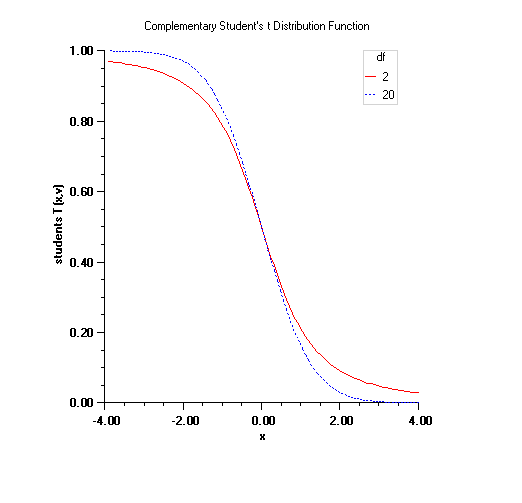| CdfComplementaryStudentsT Method |
Calculates the complement of the Student's t distribution.
Namespace: Imsl.Stat
Assembly: ImslCS (in ImslCS.dll) Version: 6.5.2.0
Parameters
- t
- Type: SystemDouble
A double scalar value for which is to be evaluated.
is to be evaluated.
- df
- Type: SystemDouble
A double scalar value representing the number of degrees of freedom. This must be at least one.
Return Value
Type: DoubleA double scalar value representing the probability that a Student's t random variable takes a value greater than t.
Method Cdf.ComplementaryStudentsT evaluates one minus the
distribution function of a Student's t random variable with
df degrees of freedom. If the square of
t is greater than or equal to
df, the relationship of a t to an
f random variable (and subsequently, to a beta random
variable) is exploited, and routine Cdf.Beta is used. Otherwise,
the method described by Hill (1970) is used. If
df is not an integer, if df
is greater than 19, or if df is greater than
200, a Cornish-Fisher expansion is used to evaluate the
distribution function. If df is less than 20 and
 is less than 2.0, a
trigonometric series (see Abramowitz and Stegun 1964, equations
26.7.3 and 26.7.4, with some rearrangement) is used. For the
remaining cases, a series given by Hill (1970) that converges well
for large values of t is used.
is less than 2.0, a
trigonometric series (see Abramowitz and Stegun 1964, equations
26.7.3 and 26.7.4, with some rearrangement) is used. For the
remaining cases, a series given by Hill (1970) that converges well
for large values of t is used.
This function provides higher right tail accuracy for the Student's t distribution.
